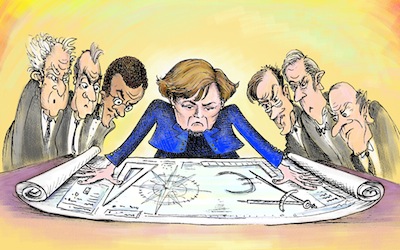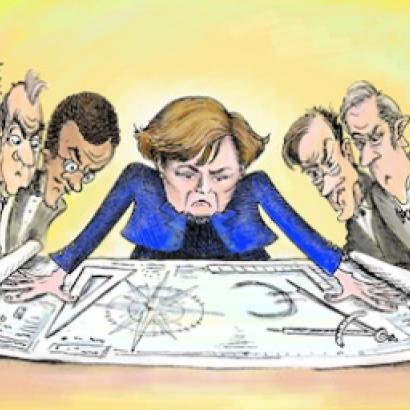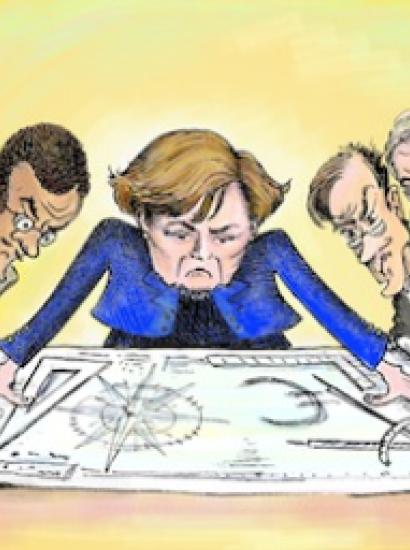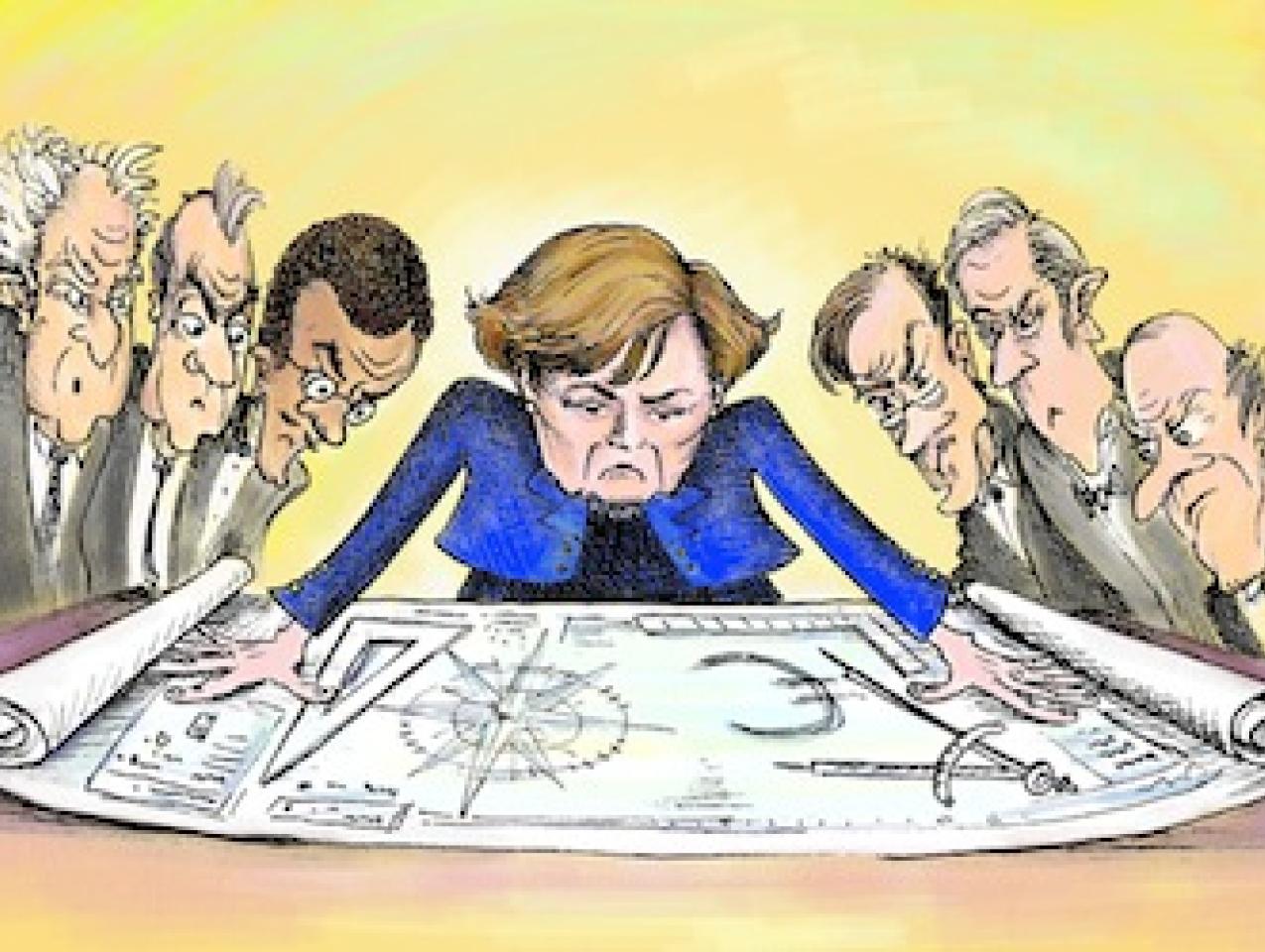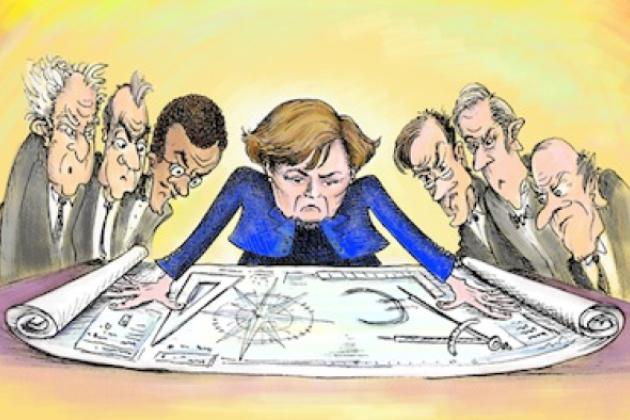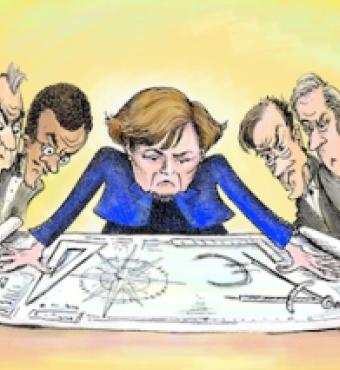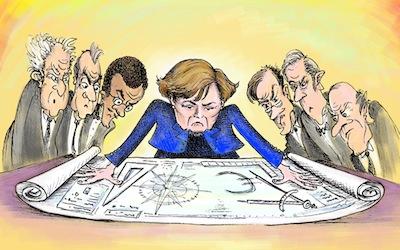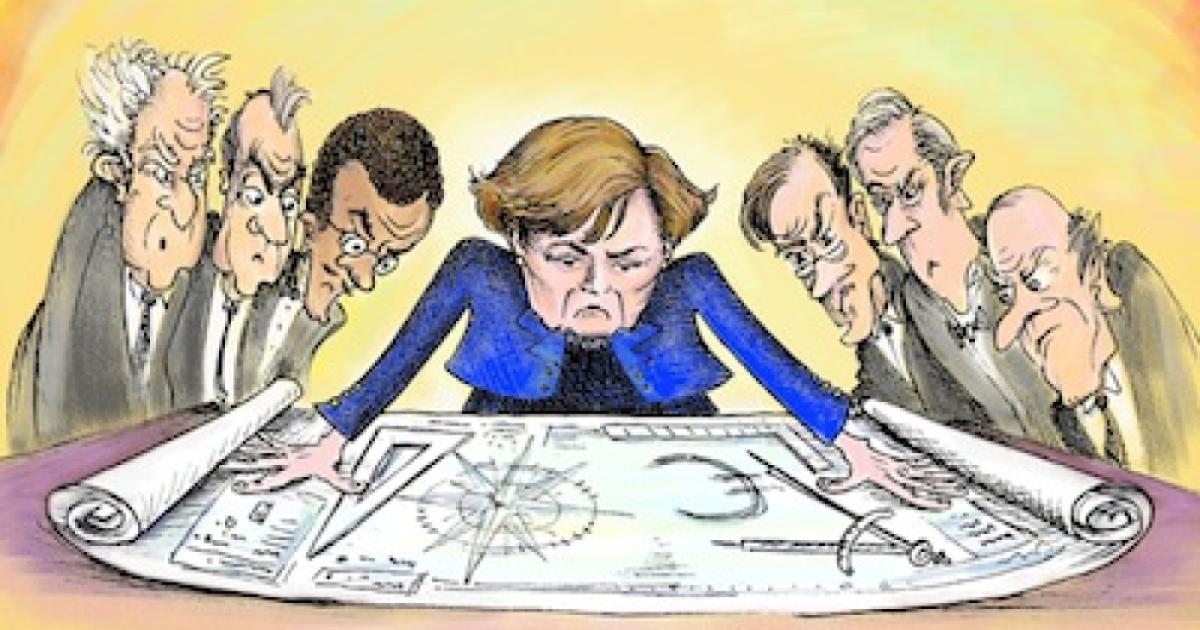- Economics
- Law & Policy
- Civil Rights & Race
- History
- International Affairs
- US Foreign Policy
For American Europe-watchers, the political maneuvering on the continent in response to the economic crises of the Eurozone is reminiscent of the two-party narratives of U.S. domestic policy. The conflict between the Republican desire to balance the budget, on the one hand, and the Democratic habit of Keynesian deficit spending, on the other, maps easily onto the European drama playing out between German Chancellor Angela Merkel, cast in the role of the austerity queen, and—with few exceptions—nearly everyone else. (Of course that generalization is not fair: on occasion David Cameron, the British Prime Minister, leaders from Finland, the Baltics, Slovakia and, famously while he was still in office, French President Nicolas Sarkozy, express some allegiance to the camp of fiscal discipline).
The predisposition to read Europe through American eyes, especially in the lead up to the U.S. presidential election, is understandable but inaccurate. The misperception has been amplified by occasional finger-pointing by President Obama and Treasure Secretary Timothy Geithner, both eager to lecture the Europeans on how they should behave. Not surprisingly, the American administration’s homilies carry as little weight in today’s Europe as they do elsewhere in the world.
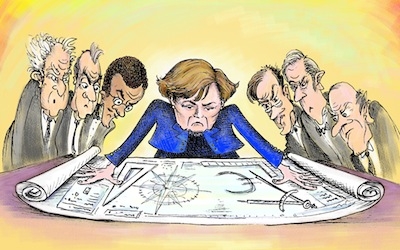
Illustration by Barbara Kelley
Misunderstanding Europe as an underdeveloped version of the American polity results from the mindset in leadership circles that the rest of the world is just like us, that there are no noteworthy differences of history, values, or institutions, and that the policy cookbooks that allegedly work in Washington (a very debatable assumption) can be shipped willy-nilly to Berlin or Brussels with nary a modification.
The American refusal to recognize the cultural complexities within Europe—or, for that matter, elsewhere—is the price it pays for an education system that minimizes the opportunities students have to study other languages, cultures, and histories. We therefore end up with a political system that demeans American politicians for speaking other languages, as we catapult narrow-minded monoglots into high office or onto op-ed pages. No wonder we misunderstand the European crisis.
National Sovereignty Under Siege in Germany
The crisis just underwent a quantum leap in complexity, shattering the cliché narrative of a battle between parsimonious Germans and spendthrift southern Europeans. That simplistic view, which reduces the European conflict to a struggle between Chancellor Merkel and the newly elected Socialist President of France Francois Hollande, or that mobilizes World War II images to depict an imperious Germany against a helpless Europe, misses the genuinely important point of a political and constitutional conflict that has just begun to erupt within Germany. Merkel’s most important adversaries are turning out to be not in Paris or Brussels, Madrid or Athens, but at home, in the German Constitutional Court.
An analog to the U.S. Supreme Court, the Bundesverfassungsgericht has its seat in the southwest German city of Karlsruhe, far away from Berlin; its distance from the capital embodies the principle of separation of powers and the spirit of decentralized federalism at the heart of the German Constitution. Andreas Vosskuhle became the youngest President of the Court in 2010.
On June 19, the Court issued a unanimous ruling endorsing a complaint submitted by the Green Party caucus in the Bundestag, the German legislature, that the Merkel administration had infringed on the rights of the legislative branch by failing to inform it adequately about the negotiations for the European Stability Mechanism during 2011. Article 23 of the German Constitution explicitly calls for substantial involvement of the Bundestag in matters of the European Union because of the EU’s potential to limit German sovereignty. In effect, the Court found that the government had failed to involve the legislature sufficiently and therefore ran afoul of fundamental expectations for democratic government.
At stake then is not only a conflict among the three branches of German democracy—the government, the Bundestag, and the Court—as if that were not enough to be worrisome in any democracy. In the matter at hand, the June 19 ruling highlighted how the Merkel government’s pursuit of a policy of European cooperation was running up against principles of democratic national sovereignty. Are Europe and democracy compatible?
This twist in the European plot significantly complicates the standard narrative of the Euro crisis. Received opinion casts the Merkel government as the recalcitrant opponent of a Europe in need, the advocate of a tight-fisted austerity politics, greedily withholding German assistance to a continent in need. The Court’s ruling casts a very different light on all of this by portraying the Merkel administration as relentlessly pursuing a policy of Europeanization, while minimizing the role of the legislature, in explicit contradiction to the stipulations of the Constitution for its timely involvement.
The Merkel Solution
No serious observer of Germany can doubt that Merkel adamantly supports the agenda of “More Europe,” i.e., an ever-greater integration of the countries on the continent. She inherits this Europeanizing vision from her mentor, former Chancellor Helmut Kohl. While Kohl nurtured the European project through the eruption of German unification, Merkel faces the extraordinary challenge of rearticulating the vision of the European Union in the context of the economic crisis. To do so, in her view, requires the adoption of sound budgetary principles as articulated in the European Fiscal Pact, developed in response to the sovereign debt crisis.
At the same time, she warily eyes the emergence of hostility toward the European agenda in that part of the German electorate that fears being saddled with southern European debt and the devastations of inflation. On her left, she faces proponents of deficit spending and higher taxes. On her right, she can see the gradual emergence of Euro-skeptical opponents of integration who favor national sovereignty. Her political strategizing involves steering a course among these antagonists.
The Fiscal Pact has the status of an intergovernmental treaty. It was signed by most European Union member states in March of this year (the United Kingdom and the Czech Republic did not support it). For it to go into effect, however, the treaty requires ratification by at least twelve national parliaments (Ireland alone pursued plebiscitary approval). This is where the second act of the German constitutional stalemate begins.
The German Constitution requires legislative approval before any genuine aspects of sovereignty are delegated to an international body, and both the Fiscal Pact and the European Stability Mechanism certainly meet that criteria: Budgetary decisions, typically the province of legislatures, would be subject to oversight by an international body composed of representatives of the executive branches of national governments. To win approval for an agreement of this gravity, the Merkel coalition government had to attract support from opposition parties, the Social Democrats and the Greens.
As the number of Euroskeptics in the ruling coalition has grown, the government became all the more dependent on support from the opposition, and it eventually had to buy that support with a commitment to pursuing a European tax on financial transactions. Once negotiations for this agreement were finalized, a Bundestag vote on the Fiscal Pact was scheduled for late June, which would have cleared the way for implementation of the Fiscal Pact.
It was, however, precisely at this point that the Constitutional Court suddenly intervened again, only days after the June 19 ruling. In light of pending complaints against the Fiscal Pact, the Court appealed directly to the German President, Joachim Gauck, to refrain from signing the legislation—not yet formally voted upon but sure to pass the legislature in light of the political agreement—until the Court would have time to review it in light of the complaints
What are the results of this gridlock? The Merkel government’s hope to see the Fiscal Pact and the European Stability Mechanism in place early this summer will not be realized. The expectation that German adoption of the Fiscal Pact would calm capital markets will be disappointed. The ripple effect on the Euro crisis is unpredictable, but this domestic German conflict will certainly retard Europe’s ability to respond to deteriorating economic conditions. Any next steps are dependent on the pace of the Constitution Court, but Court President Vosskuhle has made it clear that he values the wisdom of proceeding slowly and methodically.
In addition, these conflicts within the institutions of German democracy demonstrate that the Euro crisis is not a merely technical problem to be mastered by figuring out the quantitative sweet spot between austerity measures and deficit spending. In Germany, Europe’s largest economy, and in every other European country, complex intersections of politics, history and cultural values are at stake. In light of their national history, Germans may have more reasons than others to try to safeguard democratic institutions, but all European polities have to face the structural tension between maintaining the democratic character of national sovereignty and delegating power to European structures of governance, largely viewed as bureaucratic and outside normal processes of electoral legitimacy.
This is the European Union’s notorious democracy deficit: the inability to coordinate deep-seated national loyalties with Europe-wide structures. That’s why American policymakers need detailed qualitative knowledge of Europe in order to avoid simplistic projections of American narratives onto other cultures.







